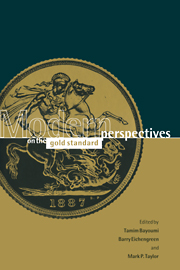Book contents
- Frontmatter
- Contents
- List of figures
- List of tables
- Notes on the contributors
- I Introduction
- II Operation of the gold standard
- III Adjustment mechanisms
- IV Monetary issues
- 9 Money demand and supply under the gold standard: the United Kingdom, 1870–1914
- 10 Stability and forward-looking behavior: the demand for broad money in the United Kingdom, 1871–1913
- V Exchange rate behavior
- VI Conclusions
- Index
9 - Money demand and supply under the gold standard: the United Kingdom, 1870–1914
Published online by Cambridge University Press: 05 November 2011
- Frontmatter
- Contents
- List of figures
- List of tables
- Notes on the contributors
- I Introduction
- II Operation of the gold standard
- III Adjustment mechanisms
- IV Monetary issues
- 9 Money demand and supply under the gold standard: the United Kingdom, 1870–1914
- 10 Stability and forward-looking behavior: the demand for broad money in the United Kingdom, 1871–1913
- V Exchange rate behavior
- VI Conclusions
- Index
Summary
Introduction
This chapter is concerned with the behavior and determination of money demand and money supply in a particular monetary regime, the gold standard, and in a particular country, the United Kingdom. Restriction to one country plainly raises concern over how representative of the regime the results we set out may be. Although such concern is inevitable, it should not be overdone. This is partly because restriction to one country is to an extent forced on us by the data – for the United Kingdom has for this period higher-quality, more consistent and complete, data than exist for other countries under gold standard regimes. But there are more and better reasons than that for accepting the results as representative. First, they are completely unsurprising; they are as theory would lead one to expect. Second, they are from a period of comparative economic tranquillity in the United Kingdom; there is thus little chance that the results are dominated by some extraordinary, important but unique, event. There is every reason to think that the findings are what should be expected qualitatively (and quantitatively in one important respect, homogeneity of money demand with respect to the price level) in every other gold standard country.
Nonetheless, there are some institutional features which are important, and should be set out before the detailed findings are examined.
- Type
- Chapter
- Information
- Modern Perspectives on the Gold Standard , pp. 261 - 283Publisher: Cambridge University PressPrint publication year: 1997
- 2
- Cited by



